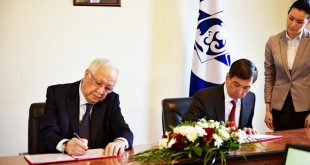
In the years following the II World War, different fields of industry and agriculture saw some remarkable growth and progress in Azerbaijan. Considerable steps were taken forward for the enhancement of culture and education in the country. The Baku oil played a sizable role in the revitalization and advancement of the debilitated economy of the war-ravaged Soviet Union. Exploration of the new oilfields which were discovered in Tataristan, Bashkirdistan, Tumen owing to the conscientious partnership of the Azerbaijani specialists further enlivened the oil industry across the entire country. The vigorous people of Azerbaijan were participating dynamically in the recovery and development of the Soviet economy in so many other areas of the SSSR as well.
But, despite the significant achievements and marked success that had been gained in previous years due to the ingenuity and creativity of the Azerbaijani people, the economy of the country had relapsed into a very deep and protracted recession during the 1960s. A wide range of intrinsic and extrinsic reasons had put both the industrial and agricultural domains of the economy on a steady downslide. Long-drawn-out regression in economy hampered the development of the country severely which in turn deteriorated the welfare of the people to the level of poverty. Azerbaijan started lagging behind the other Soviet countries in terms of growth level of the manufactured industrial goods, gross domestic product and labor productivity. The worst part was that the downswing of the economy and overall growth was swiftly exacerbating. Especially, agriculture of the country was on a constant decline. Application of the scientific accomplishments and technological findings to the manufacture was literally brought next to naught.
Heydar Aliyev has assessed the economic situation of the country during the 1960s in the following terms: “It would be perfectly accurate to say that the economy of Azerbaijan had entered into the stage of abysmal and extended recession during the 60s. The only way to reverse this dismal situation was to formulate new conceptual principles and approaches for the gainful development of economy, reshuffle the structural establishment radically for the profitable growth of agriculture and put new methods and incentives into practice for the encouragement of industrial and business executives”.
At such a trying and demanding time, fundamentally important changes were made in the leadership of the country which proved to be to the benefit of the Azerbaijani people later on. Because it was Heydar Aliyev, the great guardian and advocate of his nation who was brought into power in 1969. In order to convert Azerbaijan into one of the most leading countries of the Soviet Union, Heydar Aliyev embarked on an immense task of carrying out an all-embracing extensive reform program in all areas of life despite the totalitarian Soviet rule and prevailing complex historical circumstances.
More than 50 years of the XX century history of Azerbaijan is closely associated with the name of Heydar Aliyev. He is considered to be the creator and national leader of the present Azerbaijan. Heydar Aliyev had started his state-building activities long before he had assumed power in 1969. Starting his career in law enforcement agencies of Azerbaijan, H.Aliyev had managed to overcome all the obstacles and hindrances deliberately put in his way and rise to the post of head of the State Security Committee of Azerbaijan, the main bulwark of the Soviet Union in Azerbaijan. As a result of his determined and purposeful work under extremely difficult conditions, a number of serious measures were taken aimed at purging the State Security Committee of Azerbaijan of the malicious enemies of the Azerbaijani people and admitting the competent Azerbaijanis to service in law enforcement agencies for the first time in the Soviet history despite the overwrought circumstances.
Since 1920-1930-s it was Armenians and other non-Azerbaijanis who had the upper hand in the State Security Committee of Azerbaijan. The atrocious repressions and bloody executions carried out against the Azerbaijani people at that time were all worked out specifically by this Committee under the pretense of State Security. That’s why removal of Armenians and other adversaries of the Azerbaijani people from the State Security Committee and induction of the proficient Azerbaijanis to service in law enforcement agencies at the initiative of Heydar Aliyev was a tremendously difficult, but worthy task at a time when the Dashnak-Armenians disguised as Bolsheviks were committing horrible slaughters against the Azerbaijani people in the name of cooperating in establishment of the Soviet rule in Azerbaijan. It should be emphasized that it was the same Dashnak-Armenians who had facilitated and aided the occupation of Azerbaijan in 1920 by the Soviet army after having perpetrated unspeakably horrendous massacres against the Turkish-Muslim population of Azerbaijan in March of 1918. Having settled themselves securely in the highest posts and decision-making process of the KGB and NKVD, this time the Dashnak-Armenians were murdering the leading intellectuals and literary figures of the Azerbaijani people under alleged reasons of treason and subversion in order to annihilate the spirit of freedom and independence. By fabricating the concocted stories of criminal acts, they were subjecting the Azerbaijani people to severe tortures and sufferings. So, by initiating admittance of the adept and skilled Azerbaijanis to service in the State Security Committee, Heydar Aliyev actually prevented the future persecutions and repressions against the Azerbaijani people.
Towards the end of 1960s, the zealous activities of Heydar Aliyev dedicated to the emancipation and development of the Azerbaijani people assumed more extensive and versatile role. By being elected the First Secretary General of the Central Committee of the Communist Party of Azerbaijan in 1969, Heydar Aliyev became the main steering force in Azerbaijan as the head of the supreme governing body at a time when life in the country was at a complete stalemate and the economy had relapsed into lingering regression. Appointment of Heydar Aliyev as the First Secretary of the Central Committee was a turning point in the history of the Soviet Azerbaijan. The course of later events proved that Heydar Aliyev had already started laying the foundation and preparing the groundwork for the present independent state of Azerbaijan back then in 1960s.
Having a close familiarity with all the peculiarities of the Soviet regime and a masterful expertise on administration of the state affairs due to his immense experience, as soon as he came to power Heydar Aliyev started taking sweeping measures in order to pull the hard-pressed people of Azerbaijan out of the all-pervasive austere economic situation. With great foresight and perspicacity he ordered the immediate formulation and execution of the complex, all-encompassing economic development programs which would ensure the dynamic and all-inclusive growth of the country in the long run. Heydar Aliyev received very warm welcome and great support of the Azerbaijani people due to his deep insight and sagacity. Heydar Aliyev started pursuing a judicious policy of putting Azerbaijan on the way to progress through utilization of the vast economic potential of the Soviet Union. In a word, he devoted his life to the liberation and development of his nation selflessly.
Pressing the most imperative issues regarding the revitalization of the various fields of economy and agriculture in Azerbaijan first at the Politburo of the Central Committee of the Communist Party of the Soviet Union, then at the plenums of the Central Committee and at the congresses of the Communist Party, Heydar Aliyev was determinedly working to get new decisions passed for the development of Azerbaijan. Heydar Aliyev wanted to convert Azerbaijan into a powerful, self-sufficient and technologically fully advanced country and a selfregulating administrative-economic unit within the Soviet Union. By mobilizing the whole nation to work for the accomplishment of this goal, Heydar Aliyev had actually commenced the independent state-building process in Azerbaijan.
Despite the countless hurdles and encumbrances, Heydar Aliyev achieved the unachievable and managed to influence the Soviet Government to adopt five special all-inclusive decisions with respect to the full development of Azerbaijan. And with the same resolution he ensured the implementation of those decisions and set about propelling the Azerbaijani people into action. As a result of the complete mobilization of the country’s economic and intellectual resources, the years of 1970-1985 saw the most vivid growth and expansion in all spheres of life in Azerbaijan. All fields of industry and agriculture became vibrant. Fundamental structural modifications were introduced in the economy of the country. New revolutionary branches of industrial manufacturing were launched. Significant measures were taken to ensure a proportional growth level in industry across the country. Special attention was laid on the increment of the scientific research directly related to the industrial manufacture. Thus, within a short span of time Azerbaijan grew to be one of the leading countries of the Soviet Union in terms of the accomplishments in economy and scientific-technological findings applied in the industrial manufacturing. The quality level of the manufactured goods had also increased incomparably.
As a result of the competent leadership and farsighted, prudent policies of Heydar Aliyev Azerbaijan was converted to the foremost agricultural country of the Soviet Union. Azerbaijan was standing out especially because of the sophisticated viticulture and cotton-growing. The welfare of the people had improved markedly. The livelihood of the villagers and workers had also increased considerably. Construction of new accommodations and amenities as well as cultural establishments was in full swing in the villages of Azerbaijan. During the years of 1970-1985, hundreds of new plants, factories, industrial enterprises were opened in Azerbaijan. The number of the newly-launched large industrial enterprises and institutions exceeded 213. Azerbaijan had turned into one of the central countries in the Soviet Union in terms of the variety and importance of the manufactured goods in the country. 350 different items were being manufactured for exportation to 65 foreign countries. The overall quantity of the industrial goods manufactured during these years outweighed the amount produced in previous 50 years. Azerbaijan resembled a huge construction ground in those years. The look of Baku and the provinces of Azerbaijan had undergone an enormous transformation due to the constant renovation and modernization process.
One of the historic achievements brought to pass during the years of 1970-1985 was preparation of the trained national experts and qualified specialists for the future of Azerbaijan. Therefore, in accordance with the extensive development program laid down for the speedy revival of the economy, the network of secondary and higher education institutions was largely expanded throughout the country. In these years, 3500 students were granted scholarship and sent to 170 various reputable universities of the Soviet Union. The number of the students sent abroad annually surpassed 800. Improvement of the military education was one of the priority issues. Students were sent to the high-status aviation academies under the personal patronage of Heydar Aliyev in order to gain necessary proficiency for taking part in space mission programs of the Soviet Union.
As a result of the all-inclusive complex development programs initiated and carried out painstakingly by Heydar Aliyev in 1970-1980s, the economy of Azerbaijan was transformed into the preponderant power in the Soviet Union which had entered into the stage of gradual disintegration then. Azerbaijan had gained an outstanding dominance among the other Soviet Republics in terms of its industrial, agricultural and cultural growth due to the focused and insightful policies of Heydar Aliyev. Deep vision and forethought of the national leader of Azerbaijan had paved the way for the liberation of the Azerbaijani people and establishment of the independence of Azerbaijan many years later. Heydar Aliyev himself has evaluated the years of 1970-1985 as follows: “The most important outcome of the achievements brought to pass during the Soviet rule is that the economic, scientific-technological and cultural potential gained at this period has formed a strong foundation for the present Azerbaijan to function as a fully independent and self-regulating state”. Heydar Aliyev was vigorously struggling against the authoritarian and oppressive rule of the Communist regime in a way that no one else could have done under the intricate circumstances imposed by the Soviet era. In return for the agonies and tortures inflicted upon his nation by the repressive policies of Kremlin, Heydar Aliyev was retorting robustly by taking clever and audacious steps such as erecting edifices and sculptures of the victimized and persecuted personalities in each and every part of the country, bringing the corpse of Hussein Javid to Azerbaijan many years after his demise in exile and putting up a memorial near Sapun Kora as a honorary tribute for thousands of Azerbaijanis perished in Kerch and Krim.
It’s an irrefutable fact that it was specifically during the years of Heydar Aliyev’s leadership that the distinguished poets, writers and composers of Azerbaijan were conferred upon an honorary name of Hero of Socialist Labor for the first time in the Soviet history. On the order of Heydar Aliyev, the stately sculpture of Nariman Narimanov was erected in Baku. This was a clear manifestation of Heydar Aliyev’s unwavering courage in face of the omnipotent Soviet domination. Nariman Narimanov had been banished from Azerbaijan and labeled as a militant nationalist because of his devoted and faithful services to his Motherland. Later on by putting up a commemorative monument for Nariman Narimanov in the city of Ulyanovsk, Heydar Aliyev actually once again proved that no power in this world, not even the heavyhanded Soviet regime could have averted him from his steadfast loyalty to his cause which was the protection and fortification of his country and emancipation of the browbeaten Azerbaijani people.
During the years of Heydar Aliyev’s leadership, the exploration of the history of Azerbaijan expanded. Accordingly, the national-spiritual life of the Azerbaijani people was revivified as well. The Encyclopedia of Azerbaijan compiled under the supervision of the eminent thinker of Azerbaijan, Rasul Rza was a true embodiment of the national awakening and scientific-cultural development in the country. The chief editor of the encyclopedia and the other compilers were delivering forceful speeches with regard to the misrepresentation of the historical background of the Azerbaijani people. They were urging inclusion of the undeniable historical facts in encyclopedia without distortion such as the role of Turkish ethnos in formation of the Azerbaijani people, occupation of North Azerbaijan by Russia as well as an unbiased examination of the valuable services rendered to the people of Azerbaijan during the People’s Republic of Azerbaijan and invasion of Azerbaijan in April of 1920 by the Soviet forces. At the initiative of Rasul Rza, the historical maps of Azerbaijan were composed and published in Kiev for the first time in the Soviet history. These maps were issued both in Azerbaijani and Russian languages under the editorship of Rasul Rza in 1972. Alarmed by the emerging national awareness, the Soviet regime availed this opportunity to label the impartial intellectuals of Azerbaijan as fanatic nationalists, bourgeois ideologists and the enemies of the Soviet rule in Russia and sent the son of Shaumyan, the Armenian butcher who had craftily masterminded the bloody massacre of March in1918 against the Azerbaijani people to Baku as the first deputy of the chief editor of the Comprehensive Soviet Encyclopedia. Although as one of the main disseminators and executers of the suppressive Soviet ideology, I.S.Shaumyan wanted to take advantage of this situation to disparage and denigrate the Azerbaijani intellectuals and scholars, thanks to the deep perception and unbending courage of Heydar Aliyev, the majority of the intellectuals, including the compilers of the encyclopedia were saved from persecutions of KGB and punitive measures of the Communist Party of Russia. The actual historic significance of the achievements brought to pass during the years of Heydar Aliyev’s leadership lies in the fact that as a result of all the developments and accomplishments materialized in these years the spirit of freedom and independence was awakened among the Azerbaijani people once again. Thus, feelings of national esteem and national consciousness were greatly bolstered and strengthened due to the dutiful guidance and unwavering dedication of Heydar Aliyev. The revival of national awareness meant recommencement of the national liberation movement, but this time in a more subtle and covert way. This success is deemed to be the unmatched feat of Heydar Aliyev. Therefore, Azerbaijan was fully prepared to function as an independent and self-regulating state when the Constitution Act declaring the state independence of Azerbaijan was adopted on 18th of October in 1991 following the downfall of the Soviet Union.
 Oval Useful news from Azerbaijan and Caucasus
Oval Useful news from Azerbaijan and Caucasus


